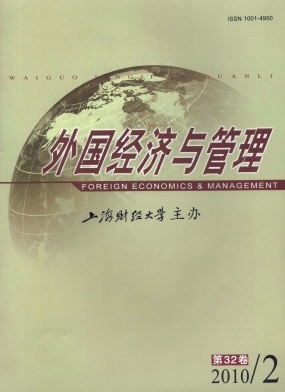组织记忆研究前沿探析、多重存储模型构建与未来研究展望
外国经济与管理 2010 年 第 32 卷第 02 期, 页码:24 - 31
摘要
参考文献
摘要
组织记忆理论所表征的组织知识以及组织成员获得、存储和提取知识的过程,对于阐释组织知识管理与成员间互动机制具有重要的意义。本文在回顾性界定组织记忆概念内涵的基础上,梳理了组织记忆研究的不同理论视角,阐述了组织记忆过程理论模型的研究进展,分析了组织不同记忆系统之间的互动机制,提出了组织记忆多重存储模型,最后探讨了组织记忆多重存储模型的未来研究方向。
[1]Moorman,C,and Miner,AS.Thei mpact of organizational memory on newproduct performance and creativity[J].Journal of Mar-keting Research,1997,34(1):91-106.
[2]Anand,V,Manz,C C,and Glick,W H.An organizational memory approach toinformation management[J].Academy of Manage-ment Review,1998,23(4):796-809.
[3]Stein,E W.Organizational memory:Reviewof concepts and recommendations for management[J].International Journal of Informa-tion Management,1995,15(2):17-32.
[4]Hollingshead,A B.Perceptions of expertise and transactive memory in work relationships[J].Group Processes&Intergroup Rela-tions,2000,3(3):257-267.
[5]Walsh,J P,and Ungson,G R.Organizational memory[J].Academy of Management Review,1991,16(1):57-91.
[6]Cohen,W M,and Levinthal,D A.Fortune favors the prepared firm[J].Management Science,1994,40(2):227-251.
[7]Chang,D R,and Cho,H.Organizational memory influences new product success[J].Journal of Business Research,2008,61(1):13-23.
[8]Kyriakopoulos,K,and Ruyter,K.Knowledge stocks andinformation flows in newproduct development[J].Journal of ManagmentStudies,2004,41(8):1 469-1 498.
[9]Cramton,C D.The mutual knowledge problemandits consequences for dispersed collaboration[J].Organization Science,2001,12(3):346-371.
[10]Si mon,H A.Bounded rationality and organizational learning[J].Organization Science,1991,2(1):125-134.
[11]Hansen,M T.Knowledge networks:Explaining effective knowledge sharing in multiunit companies[J].Organization Science,2002,13(3):232-248.
[12]Majchrzak,A,Jarvenpaa,S L,and Hollingshead,A B.Coordinating expertise among emergent groups responding to disasters[J].Organization Science,2007,18(1):147-161.
[13]Hollingshead,A B.Retrieval processes in transactive memory systems[J].Journal of Personality and Social Psychology,1998,74(3):659-671.
[14]Moreland,R L,and Myaskovsky,L.Exploring the performance benefits of group training:Transactive memory or i mproved com-munication[J].Organizational Behavior and Human Decision Processes,2000,82(1):117-133.
[15]Baddeley,A.Working memory:Looking back and looking forward[J].Nature Reviews Neuroscience,2003,4(1):829-839.
[16]Holan,P M,and Phillips,N.Remembrance of things past?The dynamics of organizational forgetting[J].Management Science,2004,50(11):1 603-1 613.
[17]Fisher,S R,and White,MA.Downsizingin alearning organization:Are there hidden costs[J]?Academy of Management Review,2000,25(1):244-251.
[18]Lewis,K,Lange,D,and Gillis,L.Transactive memory systems,learning,and learning transfer[J].Small Group Research,2005,16(6):581-598.
[19]Darr,E D,and Kurtzberg,T R.An investigation of partner si milarity di mensions on knowledge transfer[J].OrganizationalBehavior and Human Decision Processes,2000,82(1):28-44.
[20]Van Der Vegt,G S,and Bunderson,J S.Learning and performance in multidisciplinary teams:The i mportance of collective teamidentification[J].Academy of Management Journal,2005,48(3):532-547.
[2]Anand,V,Manz,C C,and Glick,W H.An organizational memory approach toinformation management[J].Academy of Manage-ment Review,1998,23(4):796-809.
[3]Stein,E W.Organizational memory:Reviewof concepts and recommendations for management[J].International Journal of Informa-tion Management,1995,15(2):17-32.
[4]Hollingshead,A B.Perceptions of expertise and transactive memory in work relationships[J].Group Processes&Intergroup Rela-tions,2000,3(3):257-267.
[5]Walsh,J P,and Ungson,G R.Organizational memory[J].Academy of Management Review,1991,16(1):57-91.
[6]Cohen,W M,and Levinthal,D A.Fortune favors the prepared firm[J].Management Science,1994,40(2):227-251.
[7]Chang,D R,and Cho,H.Organizational memory influences new product success[J].Journal of Business Research,2008,61(1):13-23.
[8]Kyriakopoulos,K,and Ruyter,K.Knowledge stocks andinformation flows in newproduct development[J].Journal of ManagmentStudies,2004,41(8):1 469-1 498.
[9]Cramton,C D.The mutual knowledge problemandits consequences for dispersed collaboration[J].Organization Science,2001,12(3):346-371.
[10]Si mon,H A.Bounded rationality and organizational learning[J].Organization Science,1991,2(1):125-134.
[11]Hansen,M T.Knowledge networks:Explaining effective knowledge sharing in multiunit companies[J].Organization Science,2002,13(3):232-248.
[12]Majchrzak,A,Jarvenpaa,S L,and Hollingshead,A B.Coordinating expertise among emergent groups responding to disasters[J].Organization Science,2007,18(1):147-161.
[13]Hollingshead,A B.Retrieval processes in transactive memory systems[J].Journal of Personality and Social Psychology,1998,74(3):659-671.
[14]Moreland,R L,and Myaskovsky,L.Exploring the performance benefits of group training:Transactive memory or i mproved com-munication[J].Organizational Behavior and Human Decision Processes,2000,82(1):117-133.
[15]Baddeley,A.Working memory:Looking back and looking forward[J].Nature Reviews Neuroscience,2003,4(1):829-839.
[16]Holan,P M,and Phillips,N.Remembrance of things past?The dynamics of organizational forgetting[J].Management Science,2004,50(11):1 603-1 613.
[17]Fisher,S R,and White,MA.Downsizingin alearning organization:Are there hidden costs[J]?Academy of Management Review,2000,25(1):244-251.
[18]Lewis,K,Lange,D,and Gillis,L.Transactive memory systems,learning,and learning transfer[J].Small Group Research,2005,16(6):581-598.
[19]Darr,E D,and Kurtzberg,T R.An investigation of partner si milarity di mensions on knowledge transfer[J].OrganizationalBehavior and Human Decision Processes,2000,82(1):28-44.
[20]Van Der Vegt,G S,and Bunderson,J S.Learning and performance in multidisciplinary teams:The i mportance of collective teamidentification[J].Academy of Management Journal,2005,48(3):532-547.
引用本文
潘陆山, 孟晓斌. 组织记忆研究前沿探析、多重存储模型构建与未来研究展望[J]. 外国经济与管理, 2010, 32(2): 24–31.
导出参考文献,格式为:
上一篇:组织分析中的制度创业研究述评
下一篇:国外伦理型领导研究前沿探析





 7867
7867  658
658

